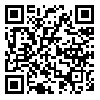BibTeX | RIS | EndNote | Medlars | ProCite | Reference Manager | RefWorks
Send citation to:
URL: http://jams.arakmu.ac.ir/article-1-4160-en.html
2- Department of Health Education and Promotion, Arak University of Medical Sciences, Arak, Iran , dr.khorsandi@arakmu.ac.ir
3- Department of Epidemiology, Arak University of Medical Sciences, Arak, Iran
Abstract
Background: One of the common and important health problems is failure to thrive in childhood. The purpose of this study was to determine the effect of education on preventive behaviors of failure to thrive in mothers with children based on health belief model.
Materials and Methods: This study is an interventional one in which 100 mothers with children one to five years involved (samples divided into two case and control groups, each of 50) sampling was done by a simple random method. For collecting information, a researcher-made questionnaire based on the health belief model and performance check list were used. Then, case group was trained for one month. 3 months after training, data were gathered and analyzed by Spss20 software. In addition to descriptive statistics, tests such as Chi-square, paired t-test and independent T-test were used.
Results: The mean age of case and control was 29.98±5.51 and 25.35±5.30 years old, respectively. The average age of children was 23.31 ± 13.14 and 27.55 ± 14.01months, respectively. Before the intervention, no significant difference was seen between groups. The average score in case group before intervention was as: knowledge(31.87±14.24), perceived susceptibility(64.23±5.86), perceived severity(64.41±9.34), perceived benefits(61.75±6.79), perceived barriers(67.91±8.14), self-efficacy(68.00±7.87), cues to action(44.53±6.82) and action(70.00±9.77). However, after the intervention, significant differences between groups in all variables were obserred.
Conclusion: According to the results, education based on health belief model is recommended for promoting preventive behaviors of failure to thrive.
| Rights and permissions | |
 |
This work is licensed under a Creative Commons Attribution-NonCommercial 4.0 International License. |





